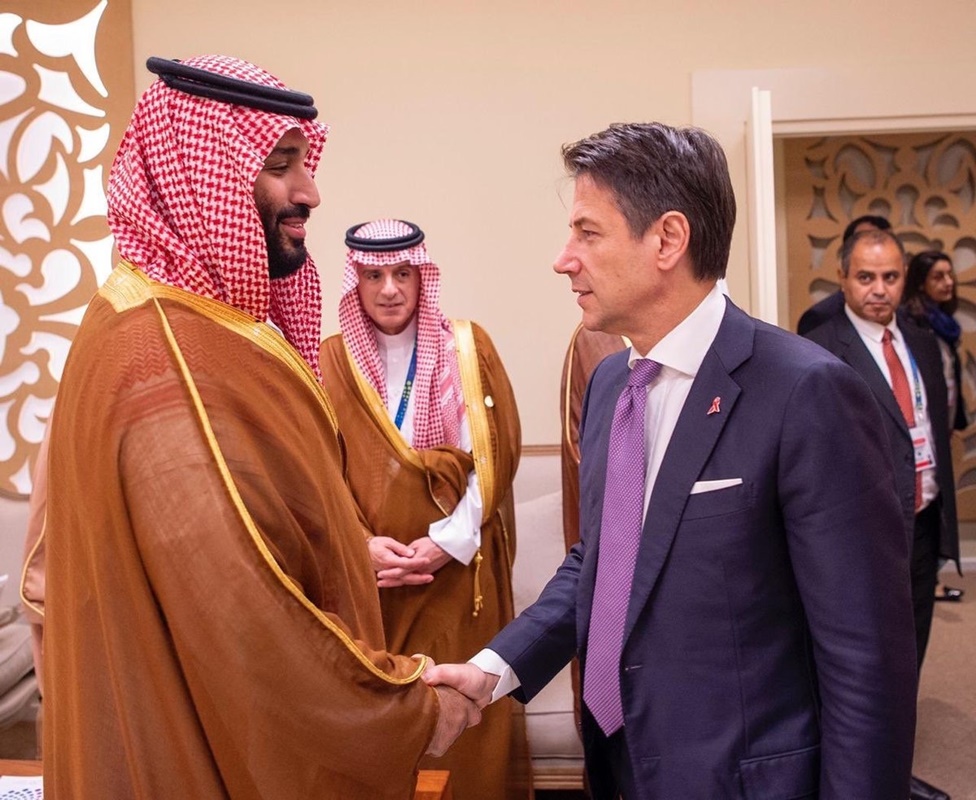The move actually predates a similar action by the United States, and it reflects Rome’s political evolution as well as its naivety when it comes to arms export (especially when compared to its European neighbours). Here’s why disarmament activists cheer, and strategic analysts urge caution
On Friday, news emerged that the Italian government had banned weapons export towards Saudi Arabia and the United Arab Emirates. The move follows years of parliamentary debate and signals a clear political will – but the matter, as often happens in these cases, is far more complex (and less ideological) than that.
For starters, commentators were quick to link the ban with the recent TV apparition of former PM Matteo Renzi in Riyadh, alongside the famed prince Mohammed bin Salman, whose name is often abbreviated to MBS.
This caused quite a stir back in Italy for several reasons, which include the ongoing political crisis (and Mr Renzi’s role in causing it), his praise of a controversial foreign head of State, and the paycheque pocketed by the politician, who is still a very active member of the Italian Senate. However, as explained by foreign minister Luigi di Maio, the ban provision had actually began its approval process a week ago.
This latter statement also addresses the second comment, that which linked Rome’s decision with Washington’s temporary ban of all new weapons deals. A move that leaves the US’ military export deals with Saudi Arabia and the UAE (including $23 billion worth of F-35 fighter jets) hanging.
The new US Secretary of State, Anthony Blinken, described it as a “routine administrative action” for a new administration. However, President Joe Biden’s campaign trail promises – and Mr Blinken’s Senate audition – both point towards Washington rethinking its practical support of the Saudi-led coalition in its military offensive in Yemen.
The Yemen crisis has been described by UNICEF as the “largest humanitarian crisis in the world,” putting 24 million people in need of humanitarian assistance. The country’s internal civil war – pitting the Houthi rebels against the former power structure since 2015 – has quickly been seized upon by Middle Eastern powers, with Iran siding with the Shia Houthis and the Saudi-led coalition (accused of targeting civilian structures alongside military ones) waging a war against them.
The previous US administration cherished its relations with the UAE and Saudi Arabia, even as Washington’s relationship with Riyadh was marred by the 2018 assassination of Washington Post columnist Jamal Kashoggi (most likely enacted on behalf of prince MBS). However, the new administration – and, circling back to it, the Italian government – are now showing willingness to reshape arms export with the two Middle Eastern powers.
In Rome, the news was received with joy by MPs from the leftist government coalition. Foreign minister Di Maio spoke of an “appropriate act” and a “clear peace message.” Yana Chiara Ehm, the MP who authored the resolution, had intended it to affect the export of “aerial bombs and missiles” capable of hitting the Yemeni civilians.
However, contrarian voices rose from the opposition. Edmondo Cirielli, an MP from the right-wing party Fratelli d’Italia, argued that the provision “is not a pacifist and neutral act as they would have us believe, but rather a favour to Iran’s expansionist policies and an action against the West’s interests.” He supported his claim pointing at Iran’s interference in the Yemen civil war, and added that Saudi Arabia, by contrast, is a “historical ally” of Italy and the US.
Now, the choice to ban those exports has been in the works since 2019 (under a different, more right-wing government than the current one – which just fell). However, zooming out of Italy, one can plainly see that even before this ban, Rome was a relatively minor provider of weapons for Saudi Arabia and UAE. In 2019, export licenses were worth €5.2 billion, slightly less than 2018.
Meanwhile, France (whose military export, according to the European External Action Service, covers 70% of the entire €138 billion European production) ranks Abu Dhabi and Riyadh respectively as their third and fourth biggest weapons recipients.
Germany and pre-Brexit UK also deal in arms with the two Middle Eastern states, and both resumed their trade after their respective bans in 2018 and 2019. Paris never dabbled in bans, and the Middle East currently absorbs 52% of French military exports.
Most importantly, these figures do not consider the United States. Cinzia Bianco, visiting fellow at the European Council on Foreign Relations, maintains that the Biden administration might sever its support for the Saudis, but it won’t do the same with the UAE, which – other than being an extremely close and strategic ally for the US – has been reducing its Yemen involvement as of late.
Secondly, the Italian ban’s wording is far from clear. For starters, it only rules out those aerial explosives which risk hitting the Yemenis – excluding, for instance, land-air and land-sea missiles, which fall under defensive armaments.
And again, in the words of general Leonardo Tricarico, “a cogent reading [of the provision] would essentially exclude all countries [from this type of export], including our biggest allies.” Needless to say, this could have enormous repercussions on the Italian defence industry, which – by the way – is already under threat from the more unfettered competition coming from Italy’s allies.
In short, the weapons export ban’s chances to make a meaningful impact in terms of human rights are little, if only for the non-Italian competition. Additionally, the ban could deal a devastating and lasting blow to Italy’s defence industries.
This is not to say that Rome shouldn’t take actions to safeguard human life and rights in Yemen (it definitely should), but rather that approaching this complex matter in simplistic terms might only be counterproductive. An ideological approach will most likely prove detrimental to Italy’s national interests.








